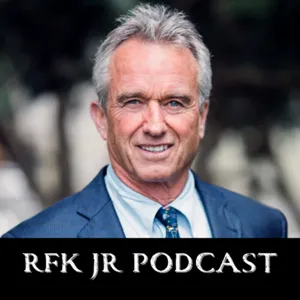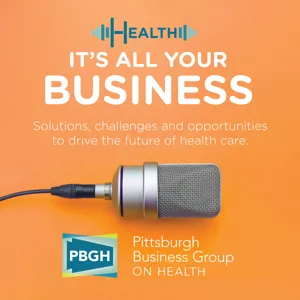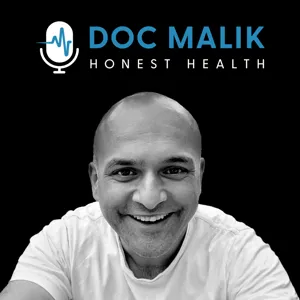Podcast Summary
The healthcare system prioritizes profits over patient care: Former drug rep reveals how the healthcare system incentivizes sickness and neglects preventative care, leading to overprescription, underpayment, and fewer options for personalized care
Our current healthcare system is incentivized to keep people sick rather than making them well. Brigham Buehler, a former drug and device rep, shared his experiences of witnessing the dark side of big pharma and the sick care system during his 15-year career in the medical industry. He saw firsthand how the average clinician has limited time and resources to provide comprehensive care due to the pressure of quarterly earnings and profits. The system prioritizes profits over patient outcomes, leading to overprescription of addictive medications and underpayment for essential procedures. As a result, small pharmacies are being undercut and bankrupt, leaving patients with fewer options for personalized, non-addictive care. Buehler founded Ways Too Well in 2018 to provide affordable preventative wellness through in-depth lab analysis and education, empowering patients to manage their health based on their diagnostic results. The healthcare system needs a shift towards prioritizing patient care and outcomes over profits.
PBMs: Middlemen Controlled by Big Insurance Companies Overcharging Consumers for Prescriptions: PBMs, owned by big insurance companies, prioritize their financial gain over negotiating affordable prescription drug prices, leading to consumers, including seniors and those in need, overpaying for medications due to gag clauses and opaque financial dealings.
Pharmacy benefit managers (PBMs), who were supposed to help drive down the cost of prescription drugs for the average American, have instead become a middleman controlled by big insurance companies. These insurance companies, which make billions in profit, now own the PBMs and dictate treatment. The PBMs, instead of negotiating for affordable prescription drug prices, negotiate for their own financial gain. This results in consumers, including seniors and those in need, overpaying for their medications. For instance, a retail pharmacy owner explained how they're forced to charge higher prices when using insurance cards due to gag clauses. PBMs generate their profits through rebates negotiated with big pharma, which are not disclosed to the public or the government. This opaque system leads to fraud and overcharging, with one state, Idaho, uncovering $260 million in fraud in just one year. The federal government, which is supposed to protect consumers, has struck deals with PBMs, shielding them from disclosing their financial dealings. This lack of transparency and accountability results in consumers overpaying for their medications.
PBMs Control Prescription Drug Market, Inflate Prices: PBMs, subsidiaries of insurance companies, manipulate prescription drug prices, leading to artificially inflated costs for employers, federal government, and patients. Potential solutions include transparency in pricing and negotiating practices, or reclassifying health insurance as catastrophic event insurance.
Pharmacy benefit managers (PBMs), which are subsidiaries of insurance companies, control the prescription drug market in America, deciding what drugs get covered, how much they get reimbursed, and what patients pay out of pocket. This results in artificially inflated prices, with the employer, federal government, and patients footing the bill while insurance companies and PBMs pocket the difference. The situation is particularly problematic for Medicare and Medicaid patients, who often face gaps in coverage and are charged retail prices for medications. The solution could involve forcing PBMs to disclose their pricing and negotiating practices, or reclassifying health insurance as catastrophic event insurance, focusing on managing acute health issues rather than preventative care. Ultimately, the goal should be to shift the paradigm towards putting patients' health outcomes first, rather than maximizing profits.
Healthcare system causing financial stress and limiting access to care: Shift towards direct pay model allows for affordable treatments and greater autonomy for healthcare providers to prioritize patient care
The current healthcare system in the US is causing financial stress for many Americans and limiting their access to necessary preventative care. The speaker shared personal experiences of intimidation from insurance companies towards healthcare providers, preventing them from performing comprehensive health screenings. This results in a lack of early detection and intervention, leading to more severe health issues and higher costs in the future. The solution, as proposed by the speaker, is a shift towards a direct pay model, where patients pay for services upfront and bypass the involvement of insurance companies. This model allows for more affordable treatments and greater autonomy for healthcare providers to make decisions in the best interest of their patients. The speaker's personal experience with starting a cost-effective compounding pharmacy and his other company aimed at preventing chronic diseases further emphasizes this approach.
Healthcare system prioritizes profits over patient health: The US healthcare system financially benefits from chronic diseases and neglects preventative care, leading to unsustainable costs and a reliance on government programs.
The current healthcare system in the United States is rigged against preventative care and in favor of treating chronic diseases once they become more expensive to manage. The insurance industry benefits financially from a sick population, as they can charge higher premiums and make profits from pharmaceutical companies. The system is designed to shift the financial burden to the patient and the government, leading to unsustainable healthcare costs and a growing reliance on Medicare and Medicaid. Preventative care, which could save billions of dollars in the long run, is often not covered due to the financial incentives for insurers to wait until patients develop chronic diseases. This results in a vicious cycle that prioritizes profits over patient health.
Finding Local Cash-Pay Clinicians for Better Patient Care: Focus on local cash-pay clinics for unbiased healthcare, concerned about FDA's prioritization of big pharma over natural health solutions, and advocating for cost-effective medications through a compounding pharmacy.
The current healthcare system is focused more on managing profits than on managing patients' health. The speaker emphasizes the importance of finding local cash-pay clinicians who are not influenced by big pharma or insurance companies, allowing them to make decisions based on what's best for their patients. The speaker also expresses concern over the FDA's actions, which they believe prioritize big pharma over natural health solutions and are leading to a war on public health. Additionally, the speaker runs a compounding pharmacy that aims to provide cost-effective medications and believes that the data and perspectives the FDA prioritizes shape their decision-making, leading to potential conflicts of interest.
FDA's Decision to Ban Certain Peptides Limits Access to Natural Treatments: The FDA's decision to ban certain natural peptides, influenced by big pharma, limits compounding pharmacies' abilities to produce life-saving treatments, exacerbating essential drug shortages and impacting public health.
The relationship between private industry and governmental regulatory bodies, such as the FDA, can lead to questionable decisions that limit access to natural, effective treatments. A recent example is the ban on certain peptides, which are natural, non-dangerous, and have been used for years to treat various conditions. The ban did not affect GLP peptides, which are patented weight loss drugs produced by big pharma. The FDA's decision is believed to be influenced by big pharma's pressure and the judicial system's response to lawsuits. This limits compounding pharmacies' abilities to produce these life-saving peptides, exacerbating shortages of essential drugs. This is not a new phenomenon, as big pharma has a history of bullying and intimidating competitors, including compounding pharmacies, to maintain monopolies and maximize profits. The consequences of these decisions can significantly impact public health and well-being.
Regulatory challenges for cost-effective peptide solutions: Despite peptides being natural compounds, their regulatory classification as dangerous hinders cost-effective solutions for patients. Strict protocols and third-party verifications ensure safety in small pharmacies, while concerns persist about safety records and transparency in large pharma.
The regulatory battle against cost-effective peptide solutions for patients, primarily due to the federal government's stance, is a complex issue. The speaker argues that peptides, as natural chemical compounds essential to life, should not be considered dangerous. Moreover, the speaker's pharmacy follows strict protocols and regulations, and third-party verifications are in place to ensure product safety. Simultaneously, there are concerns regarding the safety records and manufacturing facilities of large pharmaceutical companies, some of which have gone uninspected for years. Historical incidents of contaminated products and safety lapses in big pharma further highlight the issue. The speaker challenges the industry to hold big pharma accountable for their safety records and transparency in manufacturing processes.
FDA vs Compounding Pharmacies: A Misleading Narrative: The FDA should focus on ensuring medication safety and quality, rather than banning helpful alternatives, which can lead to black market use and harm.
The pharmaceutical industry, specifically companies like Eli Lilly, use their PR power to paint compounding pharmacies in a negative light, making it seem as if they are dangerous alternatives to traditional pharmaceuticals. However, this narrative is misleading. The FDA should focus on ensuring the safety and quality of medications, rather than banning those that may be helpful to some people, even if they pose risks to others. The ban on certain medications, such as peptides, can force people to turn to the black market, leading to more harm than good. This was seen in the opioid crisis, where overregulation led to a surge in illegal drug use and overdoses. It's essential to provide clear and accurate information to the public when banning medications, and the FDA's lack of transparency in this regard is concerning. Additionally, the relationship between the FDA and big pharma, as seen in the opioid crisis, raises serious questions about the integrity of the regulatory body.
PBMs' Powerful Grip on Small Healthcare Providers: PBMs can refuse payments, intimidate providers, and even attempt acquisitions, while exerting influence on government agencies to manipulate the system, creating a cycle of deceit in healthcare
The relationship between insurance companies, particularly Pharmacy Benefit Managers (PBMs), and small healthcare providers can be exploitative and intimidating. PBMs may refuse to pay for services or medications, crippling small businesses. They may then attempt to acquire these businesses, further consolidating power in the industry. PBMs have significant influence over government agencies like the Department of Justice, presenting only one side of the narrative and labeling small providers as fraudsters based on incomplete information. This creates a cycle where former government agents, who were once responsible for enforcing laws, join the PBMs and contribute to the manipulation of the system. The result is a complex web of deceit that undermines truth and justice in the healthcare sector.
Escaping the Profit-Driven Healthcare System: Individuals can find better care by seeking out cash pay medical practices, focusing on preventive, proactive medicine, and prioritizing personalized, predictive approaches to health.
The current healthcare system, with its complex web of insurance companies and pharmacy benefit managers, can lead to innocent people being indicted and dehumanized, all in the name of making money and building careers. This system prioritizes profits over justice and truth, intimidating clinicians into not running necessary tests or providing optimal care. To escape this paradigm, individuals can seek out cash pay medical practices, which offer better care and preventive, proactive medicine. These practices prioritize personalized, predictive approaches and aim to address chronic diseases before they manifest. The time to focus on health and wellness is when one is not sick, and there are numerous companies throughout the United States offering such services. To find these resources, take the time to research and interview various providers, just as you would for car repairs or home renovations. Remember, your health and longevity are worth the effort, and there are alternatives to the traditional sick care system.
Preventative care at cash-paid clinics for optimal health: Focus on longevity and personalized care, use biomarkers and lifestyle changes, advanced testing for prediction and prevention, and promote health rather than managing symptoms with medication.
Seeking preventative care and wellness at a cash-paid clinic is crucial for optimal health. These clinics, which focus on longevity and personalized care, can provide more comprehensive and effective interventions, often without relying on pharmaceuticals. One example is the use of biomarkers and lifestyle changes to optimize health and identify potential issues before they become chronic. Additionally, advanced testing such as DEXA scans and AI analysis can help predict and prevent health issues, keeping individuals out of the sick care system. The ultimate goal is to promote health and prevent disease, rather than simply managing symptoms with medication. Brigham Buhler, the guest speaker, emphasized this approach and expressed a desire to help people live healthier lives without relying on medications.






